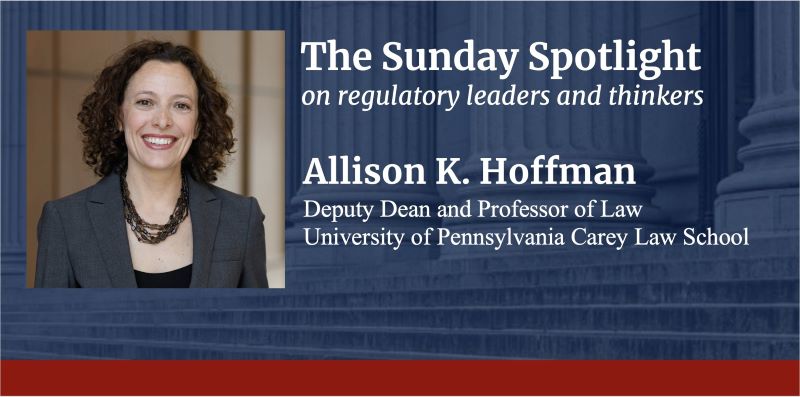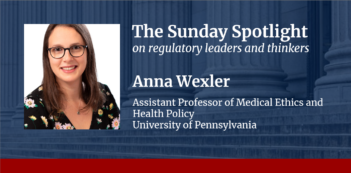
Allison K. Hoffman discusses the role of state ballot initiatives, federal law, and private equity in the U.S. health care system.
In a discussion with The Regulatory Review, Allison K. Hoffman, Deputy Dean and professor of law at the University of Pennsylvania Carey Law School, offers her thoughts on the complexities surrounding health care access, state and federal policy dynamics, and private sector involvement in health care delivery.
Hoffman emphasizes the importance of federal intervention in improving access to care by better funding long-term care services provided in nursing facilities or at home. She also highlights the limitations of state ballot initiatives in addressing systemic health care issues, especially in the wake of the COVID-19 pandemic.
Furthermore, Hoffman notes disparities between states that have and have not expanded Medicaid to lower income populations under the Affordable Care Act, shedding light on the impact of policy decisions on vulnerable populations’ access to health care services. She discusses the Medicaid gap in so-called non-expansion states, draws out the implications of allowing for Medicaid disenrollment, and provides a critical perspective on private equity firms in the health care space.
Hoffman’s research and publication focuses on the legal and policy landscapes of health care, health insurance regulation, and policy formation. Hoffman’s work is published in esteemed law reviews and peer-reviewed medical and health policy journals, and she provides commentary on health law and policy matters in media outlets such as The Hill, The New York Times, The Philadelphia Inquirer, and The Washington Post.
Prior to her tenure as a professor at the University of Pennsylvania Carey Law School, Hoffman taught at the UCLA School of Law and was a Petrie-Flom fellow at Harvard Law School. She gained private practice experience in health care law at Ropes and Gray LLP. and worked as a strategy consultant at the Bridgespan Group and the Boston Consulting Group.
The Regulatory Review is pleased to share the following interview with Allison Hoffman.
The Regulatory Review: In a recent article in The Regulatory Review, you and your co-author discussed the limits of state ballot initiatives in improving access to care absent federal action. In your opinion, what is the single most important federal action that could improve access to care nationwide?
The most important action is something that we didn’t address in that article, namely creating adequate funding for long-term care that can be used flexibly. This funding should allow for care in nursing homes or at home, as well as care provided by a professional caregiver or by family. The lack of a cohesive and adequately funded public insurance program for long-term care is creating crushing obligations for family and friends. Nearly a decade ago, I wrote about the need for policy solutions for long-term care needs that adequately take into account the risk faced by informal caregivers. Since coming to Penn seven years ago, I have collaborated with colleagues here to draw attention to what an insufficient collective commitment to long-term care funding produces, including appalling harms in nursing homes during the COVID-19 pandemic.
TRR: As you noted in your recent essay in The Review, all but ten U.S. states have adopted Medicaid expansion under the Affordable Care Act (ACA). How would you characterize access to health care services and how it affects health in holdout states versus expansion states, particularly for vulnerable populations?
We note in our essay that in seven states voters have used referenda to expand Medicaid in the face of inaction by their legislatures and governors to enable all low-income residents to enroll in the program. But referenda are not possible in most remaining non-expansion states. The tragedy in these states is that they have left millions of their poorest residents without adequate access to medical care. These states, which are mostly in the South and include Texas and Florida, create a Medicaid gap where people who earn below the federal poverty level cannot access health insurance, whereas those earning more than the federal poverty level can access federal subsidies to buy a policy on the ACA’s marketplace.
Compounding this problem is the current “unwinding” of Medicaid. During the COVID-19 pandemic, and until this March, states were not allowed to disenroll people from Medicaid. In return, they received a boost in funding for their programs from the federal government. This prohibition lifted in March, and millions of people are now losing Medicaid coverage. Some find themselves without other options if they live in a non-expansion state.
The larger issue that both non-expansion and unwinding highlights is the inequity created when health coverage for the poorest people is left to the discretion of states.
TRR: The acquisition and consolidation of health care systems and provider groups by private equity firms has sparked considerable controversy. The Federal Trade Commission Chair, Lina Khan, has recently voiced concern about this trend as part of a cross-governmental inquiry into private control over health care. Do you think private sector actors, such as private equity firms, bring value to health care?
I’m skeptical that we will see patient benefits produced by private equity’s entry into the health care space, a phenomenon which has accelerated greatly in recent years. Private equity investment is not the first form of corporate investment in health care delivery. It began decades ago with the rise of for-profit hospitals and with the increased role of private insurance companies. I’m writing about this trend now in a forthcoming book chapter, showing how the trend was shaped by the medical profession and has, in turn, shaped the profession and the medical care we all receive. Mounting evidence shows that private investment in health care has produced profits for industry without sufficient benefit for patients. Recent studies show, for example, that after a private equity purchase hospitals have more errors and nursing homes experience more deaths.
The irony is that the government, through the growth of value-based payment reform models over the past decade, has accelerated the incentives for enterprising private investors who understand these complex models and can maximize payment under them. In effect, the Department of Health and Human Services has created the conditions for accelerating this trend and is now—with other agency partners—having to deal with the consequences.
The Sunday Spotlight is a recurring feature of The Regulatory Review that periodically shares conversations with leaders and thinkers in the field of regulation and, in doing so, shines a light on important regulatory topics and ideas.



